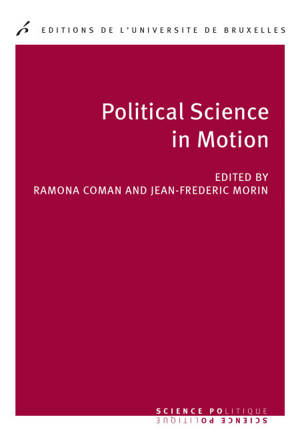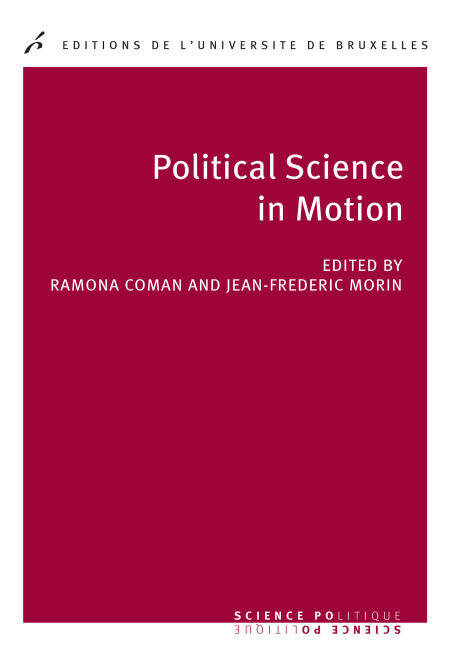
Bedankt voor het vertrouwen het afgelopen jaar! Om jou te bedanken bieden we GRATIS verzending (in België) aan op alles gedurende de hele maand januari.
- Afhalen na 1 uur in een winkel met voorraad
- In januari gratis thuislevering in België
- Ruim aanbod met 7 miljoen producten
Bedankt voor het vertrouwen het afgelopen jaar! Om jou te bedanken bieden we GRATIS verzending (in België) aan op alles gedurende de hele maand januari.
- Afhalen na 1 uur in een winkel met voorraad
- In januari gratis thuislevering in België
- Ruim aanbod met 7 miljoen producten
Zoeken
Political science in motion E-BOOK
Collection of essays
Ramona Coman, Jean-Frédéric Morin
E-book | Engels
€ 16,99
Uitvoering
Omschrijving
What are the main trends in contemporary political science research?
This book examines recent developments in political science research. What are the new influences to which the discipline opens itself up? Is political science research converging towards a single model or splitting into different streams? What are the new challenges at the beginning of the 21st century?
This collection of essays discusses three interrelated topics: the relationship between political science and the problems of politics, the relationship between political science and other fields of research, and the transformation of the profession.
EXTRACT
The past, the present and the future of political science have always been a topic of inquiry for political scientists. This collection of essays is not the first to explore the evolution of the discipline. Since its inception, scholars of politics of all persuasions have (re)produced the story of the field as a discipline and as a profession (Farr et al. 1990: 598; Blondiaux 1997: 10; Gunnell 2002: 339; Dryzek 2002; 2006). They have explored the discipline’s relation with its social and political environment, they have questioned its epistemological and ontological specificities, and more recently they have documented its professional standards, codes, and practices. As the discipline expands in different parts of the world, the attention devoted to its evolution and development has increased. Political science is a recognized object of study and “state of the discipline” studies are flourishing.
This book seeks to contribute to these recent debates about the evolution of the discipline by exploring three interrelated themes, namely (1) the discipline’s co-evolution with politics, (2) its changing relations with sister disciplines, (3) and the transformation of its practices for knowledge production and dissemination. We argue in this volume that these topics are fundamental, as they directly address the core identity of political science.
ABOUT THIS BOOK
There is very little literature on academic journals and how they function or what they achieve and Political Science in Motion is to be welcomed as a step towards filling that gap. It is well-edited, as is evident from the cross-references between chapters. It answers some of the questions that one might want to ask, while others remain unanswered" - Wyn Grant, The London School of Economics and Political Science, Review of books
This book examines recent developments in political science research. What are the new influences to which the discipline opens itself up? Is political science research converging towards a single model or splitting into different streams? What are the new challenges at the beginning of the 21st century?
This collection of essays discusses three interrelated topics: the relationship between political science and the problems of politics, the relationship between political science and other fields of research, and the transformation of the profession.
EXTRACT
The past, the present and the future of political science have always been a topic of inquiry for political scientists. This collection of essays is not the first to explore the evolution of the discipline. Since its inception, scholars of politics of all persuasions have (re)produced the story of the field as a discipline and as a profession (Farr et al. 1990: 598; Blondiaux 1997: 10; Gunnell 2002: 339; Dryzek 2002; 2006). They have explored the discipline’s relation with its social and political environment, they have questioned its epistemological and ontological specificities, and more recently they have documented its professional standards, codes, and practices. As the discipline expands in different parts of the world, the attention devoted to its evolution and development has increased. Political science is a recognized object of study and “state of the discipline” studies are flourishing.
This book seeks to contribute to these recent debates about the evolution of the discipline by exploring three interrelated themes, namely (1) the discipline’s co-evolution with politics, (2) its changing relations with sister disciplines, (3) and the transformation of its practices for knowledge production and dissemination. We argue in this volume that these topics are fundamental, as they directly address the core identity of political science.
ABOUT THIS BOOK
There is very little literature on academic journals and how they function or what they achieve and Political Science in Motion is to be welcomed as a step towards filling that gap. It is well-edited, as is evident from the cross-references between chapters. It answers some of the questions that one might want to ask, while others remain unanswered" - Wyn Grant, The London School of Economics and Political Science, Review of books
Specificaties
Betrokkenen
- Auteur(s):
- Uitgeverij:
Inhoud
- Taal:
- Engels
Eigenschappen
- Productcode (EAN):
- 9782800416960
- Verschijningsdatum:
- 5/08/2019
- Uitvoering:
- E-book
- Formaat:
- ePub

Alleen bij Standaard Boekhandel
Beoordelingen
We publiceren alleen reviews die voldoen aan de voorwaarden voor reviews. Bekijk onze voorwaarden voor reviews.









